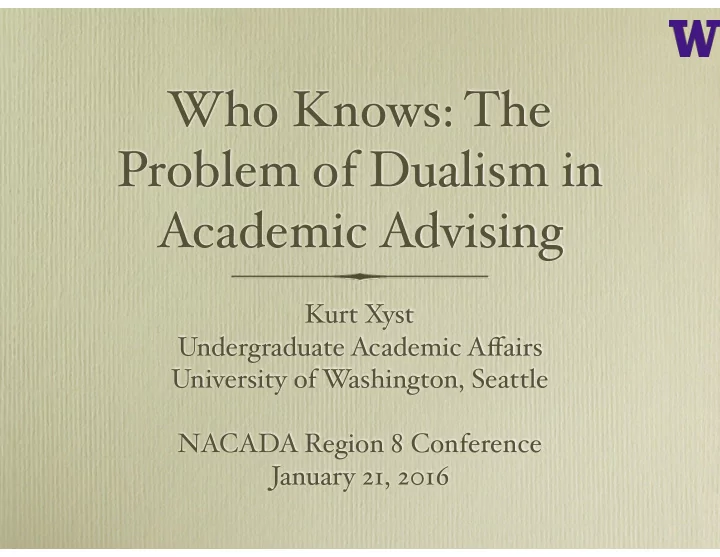

Who Knows: The Problem of Dualism in Academic Advising Kurt Xyst Undergraduate Academic A ff airs University of W ashington, Seattle NACADA Region 8 Conference January 21, 2016
1. What is dualism? 2. How does it relate to academic advising? 3.What is the problem?
“Constructivism lays the foundation for the current and historical theories and practices [ of academic advising. ] ” Musser, Academic Advising T oday
“...secular religion...all of us these days are constructivist.” D. C. Phillips, Philosophy, Science and Social Inquiry
“The principle claim of constructivism...is that knowledge is made rather than found.” Bredo, Reconsidering Social Constructivism
“Virtually all cognitive - structural theories of student development owe their origins to Jean Piaget.” Pascarella and Terenzini, How Co lm ege A ff ects Students
“ [ Constructivism ] pertains to the ways and means the cognizing subject has conceptually evolved in order to fit into the world... [ Constructivism ] is intended as a theory of knowing not a theory of being.” Glasersfeld, Radical Constructivism
“ [ Constructivism ] pertains to the ways and means the cognizing subject has conceptually evolved in order to fit into the world... [ Constructivism ] is intended as a theory of knowing not a theory of being.” Glasersfeld, Radical Constructivism
1. What is dualism? Dualism is the metaphysical view that everything that exists is composed of two parts - and one part is inherently better than the other.
2. How does it relate to academic advising? Constructivism, the espoused foundation of academic advising, assumes students stand apart from the world around them, and in doing so create true knowledge.
Academic plans are objects that live in the individual student’s head ( cognizing subject. ) Academic plans need not relate directly to demonstrable things in the world ( fit, knowing not being. ) Standard for judging academic plans is abstracted rationality ( cognizing subject, conceptual evolution. )
“It would be impossible to state adequately the evil results which have flowed from this dualism of mind and body, much less to exaggerate them.” Dewey, Democracy & Education
3. What’s the problem? Constructivism in academic advising disempowers students and reduces them to passivity.
The End?
“Breathing is an a ff air of the air as truly as of the lungs; digesting an a ff air of food as truly as of tissues of stomach. Seeing involves light just as certainly as it does the eye and optic nerve. W alking implicates the ground as well as the legs…They are things done by the environment by means of organic structures or acquired dispositions.” Dewey, Human Nature and Conduct
“Knowing marks the conversion of undirected changes into changes directed toward an intended conclusion.” Dewey, The Quest for Certainty
Conclusion I Whereas the constructivism of Glasersfeld focuses on creating and judging cognitive objects by reference to universal standards of rationality it embraces mind - body dualism to do so.
Conclusion II Dualism is antithetical to the intentions of many in academic advising becuase it strips students of power to influence the environment in which lie their interests and concerns.
Conclusion III Dewey’s naturalism seems to avoid dualism by focusing on the outcome of intentional action as the standard for knowledge.
References and Related Reading Bredo, E. ( 2000. ) Reconsidering Social Constructivism: The Relevance of George Herbert Mead’s Interactionism. In D. C. Phillips ( Ed. ) , Constructivism in Education ( pp. 127 - 157 ) . Chicago: University of Chicago Press. Dewey, J. ( 1916/1944 ) . Democracy and Education: An Introduction to the Philosophy of Education . New Y ork: The Free Press. Dewey, J. ( 1922 ) . Human Nature and Conduct . New Y ork: The Modern Library. Dewey, J. ( 1929 ) . The Quest for Certainty . New Y ork: Perigee Books. Glasersfeld, E. v. ( 1995 ) . Radical Constructivism: A W ay of Knowing and Learning . London: Falmer Press. Lowenstein, M. ( 2005 ) . If Advising is Teaching, What Do Advisers Teach? NACADA Journal , 25 ( 2 ) , 65 - 73. Musser, T. ( 2012 ) . Constructivist Foundations for Academic Advising. Academic Advising T oday , ( 3 ) . Pascarella, E. T., & Terenzini, P . T. ( 1991 ) . How Co lm ege A ff ects Student: Findings and Insights From T wenty Y ears of Research . San Francisco: Jossey - Bass. Phillips, D. C. ( 1987 ) . Philosophy, Science, and Social Inquiry. Oxford: Pergamon Press.
Recommend
More recommend